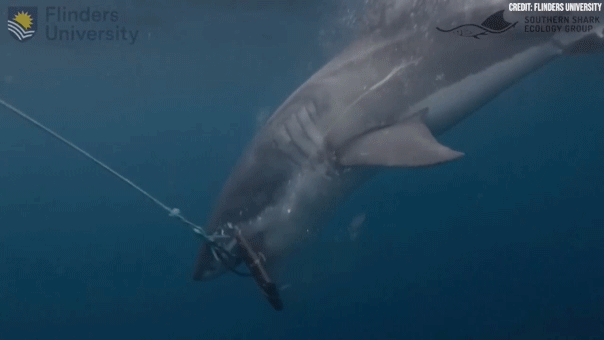**Australian Scientists Develop Bite-Resistant Wetsuit Materials to Reduce Shark Attack Fatalities**
Scientists from Australia are highlighting promising results from testing bite-resistant wetsuit materials aimed at reducing deaths caused by shark attacks. Researchers at Flinders University in Adelaide, South Australia, evaluated four innovative wetsuit materials—Aqua Armour, Shark Stop, ActionTX-S, and Brewster—by inviting white and tiger sharks to bite samples of the materials as they were dragged behind a boat.
White and tiger sharks are known to be responsible for the majority of unprovoked shark attacks worldwide.
“It’s not the entire suit, right, they’ve only used that special material in special parts of the suit, and it’s designed to protect you in the places that are most dangerous for blood loss and protect the major arteries,” explained Nick Whitney, a senior scientist at the New England Aquarium’s Anderson Cabot Center for Ocean Life in Boston. Whitney, who was not involved in the study, shared his insights with the Associated Press.
While catastrophic injuries can still occur, the scientists found that all four materials significantly lessened the damage caused by shark bites. Whitney emphasized that most fatalities from shark attacks result from blood loss rather than being dragged away or consumed by the shark.
“It’s typically a bite and release so they bleed to death,” he said. “So, the goal of these suits is to protect you in specific areas and buy extra time for you to get to the beach and get to lifeguards and get medical assistance.”
Historically, chainmail wetsuits created in the 1970s provided some protection but lacked the flexibility needed for activities such as surfing and diving. According to the researchers, “New wetsuits that incorporate strong and light fiber often used in sailing rope, ultra-high molecular weight polyethylene, offer both flexibility and protection, making them more suitable for recreational use.”
Dr. Thomas Clarke, College of Science and Engineering at Flinders University and co-author of the study, noted, “While there were small differences between the four tested materials, they all reduced the amount of substantial and critical damage, which would typically be associated with severe hemorrhaging and tissue or limb loss.”
The findings were published on Thursday in the journal *Wildlife Research*.
“Our study showed that bite-resistant materials incorporated into wetsuits can reduce damage from large white and tiger sharks (up to 3 metres) compared to standard neoprene wetsuits, even from moderate and severe bites,” Clarke added.
Professor Charlie Huveneers of Flinders University, who leads the Southern Shark Ecology Group and co-authored the study, pointed out that while the suits do not eliminate the risk of shark attacks, “our results indicate that they can reduce blood loss and trauma from major lacerations and punctures, potentially saving lives.”
The researchers concluded that all four materials “offer an improved level of protection that can reduce severe wounds and blood loss, and should be considered as part of the toolbox and measures available to reduce shark-bite risk and resulting injuries.”
—
*Stay informed on the latest developments in shark safety and protective gear by following our updates.*
https://www.foxnews.com/lifestyle/scientists-test-bite-resistant-wetsuits-could-reduce-shark-attack-damage


